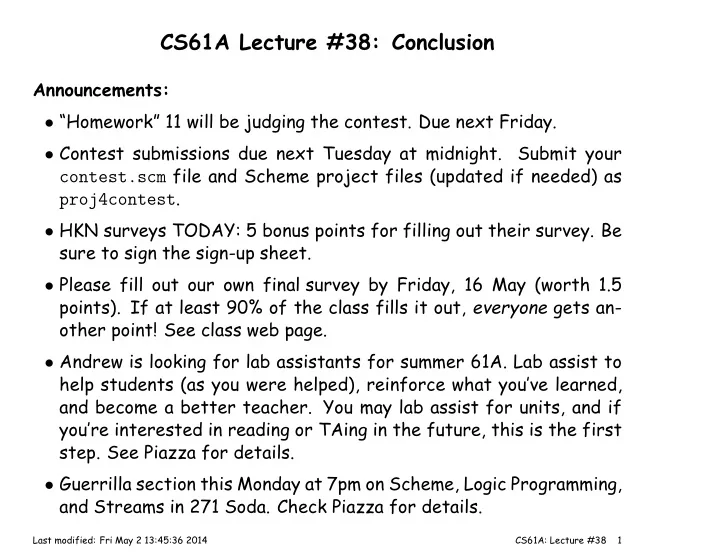

CS61A Lecture #38: Conclusion Announcements: • “Homework” 11 will be judging the contest. Due next Friday. • Contest submissions due next Tuesday at midnight. Submit your contest.scm file and Scheme project files (updated if needed) as proj4contest . • HKN surveys TODAY: 5 bonus points for filling out their survey. Be sure to sign the sign-up sheet. • Please fill out our own final survey by Friday, 16 May (worth 1.5 points). If at least 90% of the class fills it out, everyone gets an- other point! See class web page. • Andrew is looking for lab assistants for summer 61A. Lab assist to help students (as you were helped), reinforce what you’ve learned, and become a better teacher. You may lab assist for units, and if you’re interested in reading or TAing in the future, this is the first step. See Piazza for details. • Guerrilla section this Monday at 7pm on Scheme, Logic Programming, and Streams in 271 Soda. Check Piazza for details. Last modified: Fri May 2 13:45:36 2014 CS61A: Lecture #38 1
A Summary of Topics • Programming primitives • Derived programming structures • Programming-language concepts, design, and implementation • Programming “Paradigms” • Software engineering • Analysis • Side excursions • What’s Next? Last modified: Fri May 2 13:45:36 2014 CS61A: Lecture #38 2
Programming Primitives • Recursion: the all-encompassing repetitive construct; recursive think- ing • Pairs: A universal data-structuring tool. • Functions as data values, functions on functions • Exceptions: Dealing with errors. • Classes. Last modified: Fri May 2 13:45:36 2014 CS61A: Lecture #38 3
Derived Programming Structures • Can build almost anything from primitives. • Although Python also has specialized implementations of some im- portant data structures. • Sequences: – Lists: traversals, searching, inserting, deleting (destructive and non-destructive) – Trees: traversals, binary search trees, constructing, inserting, deleting • Maps. • Sequences: creating, traversing, searching, • Iterators, generators. • Trees: uses, traversing, and searching. Last modified: Fri May 2 13:45:36 2014 CS61A: Lecture #38 4
Programming-Language Concepts, Design, Implementation • Python was developed largely as a teaching language, and is simpler in many ways than other “production” languages. . . • And yet, it is a good deal more powerful (as measured by work done per line of code) than these same languages. • Still, as you’ve seen, there are problems, too: dynamic vs. static discovery of errors. • Big item: scope (what instance of what definition applies to evalu- ation of an identifier). This is what environment diagrams are in- tended to model. – Alternative: dynamic scoping. • Implementing a language [CS164]: – Interpreters – Trees as an intermediate language – Relationship of run-time environment representation to scope rules. – “Little” languages as a programming tool Last modified: Fri May 2 13:45:36 2014 CS61A: Lecture #38 5
Paradigms • Functional programming: expressions, not statements; no side-effects; use of higher-order functions. • Streams • Data-directed and object-oriented programming – Organize program around types of data, not functions – Inheritance – Interface vs. implementation • Rule-based programming (Prolog) – Declarative rather than imperative – Rule → action idea. – Logic programming: ∗ Pattern matching, pattern variables as a programming tool ∗ Declarative and imperative interpretation ∗ Application to parsing Last modified: Fri May 2 13:45:36 2014 CS61A: Lecture #38 6
Software Engineering • Biggest ideas: Abstraction, separation of concerns • Specification of a program vs. its implementation – Syntactic spec (header) vs. semantic spec (comment). – Example of multiple implementations for the same abstract be- havior • Testing: for every program, there is a test. – In “Extreme Programming” there is a test for every module. • Software engineering implicit in all our software courses, explicit in CS169. Last modified: Fri May 2 13:45:36 2014 CS61A: Lecture #38 7
Analysis • What we can measure when we measure speed: – Raw time. – Counts of selected representative operations. – Symbolic expressions of running time. – Best/worst case. • Application of asymptotic notation ( Θ( · ) , etc.) to summarizing sym- bolic time measurements concisely. Last modified: Fri May 2 13:45:36 2014 CS61A: Lecture #38 8
Important Side Excursions • User Interfaces: there are principles behind making computers us- able. • Cryptography: – protecting integrity, privacy, and authenticity of data. – Symmetric (DES, Enigma) and asymmetric (public-key) methods. • Computatbility [CS172]: Some functions cannot be computed. Prob- lems that are “near” such functions cannot be computed quickly. Last modified: Fri May 2 13:45:36 2014 CS61A: Lecture #38 9
What’s Next (Course-Wise)? • CS61B: (conventional) data structures and languages • CS61C: computing hardware as programmers see it. • CS170, CS172, CS174: “Theory”—analysis and construction of al- gorithms, theoretical models of computation, use of probabilistic algorithms and analysis. • CS161: Security • CS162: Operating systems. • CS164: Implementation of programming languages. • CS160, CS169: User interfaces, software engineering. • CS188: Artificial intelligence. • CS184: Graphics. • CS186: Databases. Last modified: Fri May 2 13:45:36 2014 CS61A: Lecture #38 10
What’s Next (Course-Wise) (II) • CS189: Machine Learning. • CS191: Quantum Computing. • EE C125: Robotics • EECS C149: Embedded Systems. • CS 150: Digital Systems Design • CS 176: Computational Biology • CS194: Special topics. (E.g.) parallel software; computer anima- tion; data science; networks, crowds, and markets; cell phones as a computing platform. • Plus graduate courses on these subjects and more. • And please don’t forget CS199 and research projects. Last modified: Fri May 2 13:45:36 2014 CS61A: Lecture #38 11
What’s Next (Otherwise)? • Programming contests. • The open-source world: Go out and build something! • And above all: Have Fun! Last modified: Fri May 2 13:45:36 2014 CS61A: Lecture #38 12
Recommend
More recommend